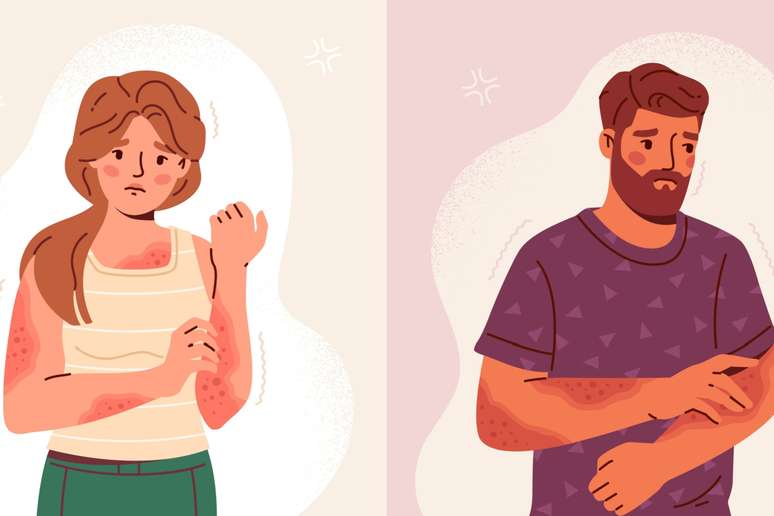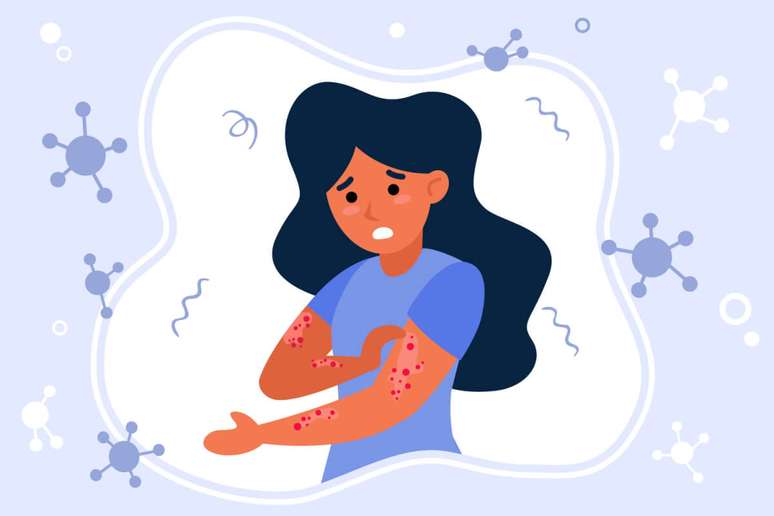The chronic disease is manifested by the appearance of red, scaly, irritated patches on the surface of the skin
Psoriasis, a chronic autoimmune condition, is defined by the appearance of red, scaly patches on the skin. Its manifestation can occur in people of all sexes and at different stages of life, from childhood to adulthood. However, it is most common between the ages of 15 and 35, and because it has a genetic predisposition, it most often affects people with a family history of the disease. Stress, lack of sun exposure, and other environmental elements can aggravate it.
html[data-range=”xlarge”] figure image img.img-7f8eceeb29e59111fe0844e8f9a1fda7xcphazsa { width: 774px; height: 516px; }HTML[data-range=”large”] figure image img.img-7f8eceeb29e59111fe0844e8f9a1fda7xcphazsa { width: 548px; height: 365px; }HTML[data-range=”small”] figure figure img.img-7f8eceeb29e59111fe0844e8f9a1fda7xcphazsa, html[data-range=”medium”] figure image img.img-7f8eceeb29e59111fe0844e8f9a1fda7xcphazsa { width: 564px; height: 376px; }HTML[data-range=”small”] .article__image-embed, html[data-range=”medium”] .article__image-embed { width: 564px; margin: auto 0 30px; }
Characterized as a common skin disease, psoriasis occurs in a scenario in which the body perceives a skin protein as abnormal, triggering a skin peeling process. This results in the formation of sizable, thick, scaly plaques that are prone to cracking and bleeding and can cause discomfort and trigger the itch.
“Areas of impact can vary, but some of the most sensitive are the scalp, face, genitals and nails. Many patients don’t wear shorts or short sleeves because their knees or elbows are affected,” explains Dr. Paola Pomerantzeff, dermatologist and member of the Brazilian Society of Dermatology (SBD).
Social effects of the disease
Although it is not contagious, many people think that psoriasis can be transmitted, so the patient with the disease tends to isolate himself socially. “Psoriasis can make people feel anxious and depressed. Psoriasis skin symptoms can increase the risk of mental illness caused by skin symptoms, such as depression and anxiety, by 32 percent, and can even lead to suicide,” warns Dr. Paola Pomerantzeff.
types of psoriasis
There are several classification systems for types of psoriasis, but the most commonly used is the clinical classification system proposed by the International Psoriasis Society (International Psoriasis Council) and the World Health Organization (WHO). Therefore, psoriasis is classified into:
1. Plaque psoriasis or vulgar psoriasis
The most common clinical form of psoriasis is manifested by thick red patches on the skin. In this type of psoriasis, the knee area is most often affected, being one of the most common manifestations of the disease.
2. Nail psoriasis
It affects the nails and fingers, leading to abnormal nail growth, thickening and discoloration. The rough surface of the nails is a notable feature of this variant.
3. Scalp psoriasis
Red areas appear with stairs thick, silvery-white patches, especially after scratching.
4. Guttate psoriasis
It is usually triggered by bacterial infections, such as those in the throat. It is characterized by small teardrop-shaped sores on the trunk, arms, legs and scalp.
5. Inverted psoriasis
It has a greater incidence in moist areas, such as the armpits, groin and regions under the breasts. This variant has distinct characteristics due to the environment in which it develops.
6. Pustular psoriasis
It is characterized by the rapid appearance of pus-filled blisters in various parts of the body. These blisters can appear a few hours after the skin turn red.
7. Erythrodermic psoriasis
It is the least common variant and can be triggered by severe burns, sudden treatment, use or abrupt withdrawal of corticosteroids, infection, or another type of poorly controlled psoriasis. It is characterized by widespread inflammation of the skin.
8. Psoriatic arthritis
This type affects joints such as elbows and knees. In addition to the skin inflammation and scaling characteristic of psoriasis, psoriatic arthritis causes severe joint pain.

How to carry out the treatment?
Psoriasis treatment can take weeks or even months before results become visible. when the disease is localized, the approach involves the prescription of topical drugs, which aim to reduce the excessive proliferation of skin cells, responsible for the formation of plaques characteristic of psoriasis.
However, they may not work for some patients and are uncomfortable, especially if multiple areas are affected. “Pills can reduce overactive immune responses, but some can trigger gastrointestinal symptoms. Injectable drugs, called biologics, are very effective but expensive and can make people a little more susceptible to infections because they lower the body’s immune activity.” “, completes Dr. Paola Pomerantzeff.
UV phototherapy and probiotics are beneficial alternatives
The application of UV phototherapy, also known as ultraviolet light therapy, involves the controlled exposure of skin affected by psoriasis to ultraviolet radiation. This strategy has demonstrated its efficacy in managing the inflammatory and scaly features of the lesions characteristic of the disease.
Another addition to the possible treatments is the incorporation of foods rich in probiotics. These are beneficial microorganisms that help maintain gut microbiota balance and immune function. The proper balance of gut bacteria can impact autoimmune diseases like psoriasis.
Exposure to the sun must be done safely
For patients suffering from this pathology it is also interesting to try to expose themselves to the sun safely, as indicated by the dermatologist. “Safe exposure to the sun can prevent psoriasis and relieve symptoms of the disease, as solar radiation has immunomodulatory effects in psoriasis control and is essential for maintaining a healthy immune system,” he says.

Introduce good habits into your routine
Good lifestyle habits also help control and treat this condition. For this, it is important to have a healthy and balanced diet, increase fluid intake, sleep well and with quality and exercise regularly, even indoors. “All this with the aim of bringing relaxation, well-being and stress control”, underlines the doctor.
People with psoriasis should take care of their mental health
Those with psoriasis are more likely to have diabetes and heart problems, and the risk of mortality is also higher. Therefore, it is important that the treatment takes all these aspects into account. It is also essential to take care of the emotional side of patients, as this condition can greatly affect self-esteem and quality of life.
“When some patients are stressed, their psoriasis gets worse, so we work on stress management. There’s even research showing that mindfulness techniques, like meditation, it can make people more responsive to psoriasis therapies,” concludes the expert.
Source: Terra
Ben Stock is a lifestyle journalist and author at Gossipify. He writes about topics such as health, wellness, travel, food and home decor. He provides practical advice and inspiration to improve well-being, keeps readers up to date with latest lifestyle news and trends, known for his engaging writing style, in-depth analysis and unique perspectives.









